The Senior (PG)

Starring: Michael Chiklis
September 2025
Warning! This is NOT a movie review. This is a critique of the film. Intended to initiate a dialogue, the following analysis explores various aspects of the film and may contain spoilers. For concerns over objectionable content, please first refer to one of the many parental movie guide websites. Ratings are based on a four star system. Happy reading!
When it comes to “based on a true story” movies, the premise behind The Senior has got to be one of the least likely and most outlandish in cinema history. Having never completed his senior year of college, Mike Flynt (Michael Chiklis) tries out for the football team at Sul Ross State University in Alpine, TX, and, against all odds, makes the team…at age 59!
And if that isn’t unbelievable enough, Mike, who is injured in training camp and rehabs all season, finally gets some snaps at the very end of the final game of the season—making Mike the oldest player in college football history.
Though there’s plenty of on-field action here to rivet football fans, The Senior (a clever double entendre) is much more than a sports movie; it’s a top-shelf “follow your dreams” flick with a strong moral undercurrent to please the faith and family crowd.
The emotional center of the movie is its poignant subplot involving two generations of fathers and sons. Flashback scenes of Mike’s father (James Badge Dale), teaching him how to be a man by bashing him with boxing gloves until he gets a bloody nose, are rough to watch. Other flashbacks show Mike repeating the cycle of violence with his own son, who, not surprisingly, is estranged from Mike as an adult.
The success of the movie fell largely on Chiklis’ broad shoulders (figuratively and literally: he’s built like a tank). Fortunately, the veteran TV (The Shield) and film (Fantastic Four, 2005) actor was more than up to the challenge, delivering a believable performance as a man who just wants a chance to redeem his violent past and set an example by finishing what he started decades earlier.
Some of the movie’s most meaningful moments involve Mike’s wife, Eileen (Mary Stuart Masterson). In one well-acted scene, Eileen names the conditions that must be met before she backs Mike’s rekindled desire to return to college football. Eileen’s deep concern and reluctant support of Mike’s dream help ground the film. Indeed, she gives voice to what we’re thinking—that this is a crazy idea that can’t possibly end well.
The other well-known cast member is Rob Corddry (Hot Tub Time Machine), who delivers a wonderfully restrained performance as laconic Coach Sam Weston. The “follow my lead” scene, where Coach Weston yells at the team and storms out of the locker room, is not to be missed.
Though the movie has certain similarities with Rudy (1993)—and even knowingly references the gridiron classic when Coach Weston says, “He’s like a 59-year-old Rudy”—The Senior is a unique entry into the annals of unlikely sport’s hero films.
So, is The Senior a schmaltzy biopic or inspirational true tale? You decide.
For me, this feel-good football flick (shrewdly released at the outset of football season), resembles its main character, a scrappy underdog that gets the job done.
Rating: 2½ out of 4
The Last Rodeo (PG)
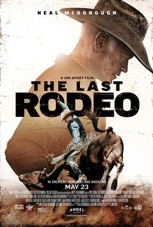
Starring: Neal McDonough
May 2025
Warning! This is NOT a movie review. This is a critique of the film. Intended to initiate a dialogue, the following analysis explores various aspects of the film and may contain spoilers. For concerns over objectionable content, please first refer to one of the many parental movie guide websites. Ratings are based on a four star system. Happy reading!
Can eight seconds feel like an eternity? It can if you’re holding on for dear life as a seething bull violently jostles your body in a dozen different directions.
Three-time bull-riding champion, Joe Wainwright (Neal McDonough), blows off multiple invitations to ride in the Legends bull-riding event in Tulsa, OK. But when his grandson is diagnosed with a brain tumor, Joe chooses to put his body on the line by signing up for one last rodeo.
Brought to us by Angel Studios (Homestead), The Last Rodeo is a faith and family focused film directed by Jon Avnet (Fried Green Tomatoes). As its name suggests, Rodeo is also a sports film, with roughly a quarter of its action centering on bull-riding. The pulse-pounding cinematography is superb, riveting viewer interest with ferocious, nail-biting action sequences. These scenes provide some much-needed action to counterbalance the movie’s many somber moments.
Avnet co-wrote the script with McDonough and Derek Presley. Though heartwarming and crowd-pleasing, the film often feels like a Lifetime drama, especially during the talky character moments. Fortunately, these emotional scenes aren’t unbearably sentimental. This is largely due to the realistic, restrained performances of the stellar core cast, which is comprised of McDonough, Sarah Jones as Joe’s daughter Sally, Mykelti Williamson as Joe’s long-time friend Charlie, and Christopher McDonald as the opportunistic rodeo organizer Jimmy Mack.
The film explores several themes, including: the power of friendship, doing whatever it takes to provide for family, the reconciliation of an estranged father and daughter, an old veteran vying against a field of young upstarts (a la Cars), and a man who stopped believing in God after the death of his wife eventually finding his way back to faith (a la Signs).
In the end, Rodeo is a fairly uncomplicated, largely predictable movie with a plot built on farcical elements (Joe competing for a championship in his upper 50s) and contrivances (Charlie tells Jimmy about Joe’s ailing son and Jimmy spills the story to news agencies, which help raise awareness and financial support to help cover the boy’s exorbitant surgery).
But it’s also an inoffensive, inspiring film that should leave audiences feeling uplifted and hopeful—that despite what’s transpired in our inner cities in recent months, our society might just survive if we pull together to help the less fortunate among us.
Otherwise, this might be America’s last rodeo.
Rating: 2½ out of 4
Unsung Hero (PG)

Starring: Daisy Betts
April 2024
Warning! This is NOT a movie review. This is a critique of the film. Intended to initiate a dialogue, the following analysis explores various aspects of the film and may contain spoilers. For concerns over objectionable content, please first refer to one of the many parental movie guide websites. Ratings are based on a four star system. Happy reading!
David Smallbone (Joel Smallbone), an Australian music promoter, has had some success in bringing contemporary Christian bands from America to the land Down Under in the late 80s. Despite sound advice to the contrary, David turns down a “lesser act,” DeGarmo & Key, and signs a major deal to bring over emerging superstar Amy Grant for an extensive concert tour.
Then the nation suffers an economic downturn, resulting in Grant performing for crowds of hundreds rather than thousands. Since David’s name appears on the contract, he ends up losing his job and foreclosing on his beautiful home.
In an act of desperation, David takes a job in America and moves his wife, Helen (Daisy Betts), and six kids (with one in the oven) to Nashville, TN. Showing up to work on the first day, David learns that his position was given to someone else. Since his work visa prohibits him from getting another job, David resorts to doing landscaping work for cash with his older kids just to afford their unfurnished house. When David solicits work at a nearby mansion, guess who opens the door? Yep, you guessed it…Eddie DeGarmo!
Right off the bat, the movie gives us a poignant lesson in the dangers of pride. David considered it beneath him to bring DeGarmo’s band over to his country. Now he’s in DeGarmo’s country scrubbing his toilet bowl. How the mighty have fallen.
Pride rears its ugly head when David is shamed by generous neighbors and fellow churchgoers. He pushes them away right when his family needs them most, when child #7 arrives. David’s inability to find a job and provide for his family sends him into a state of debilitating depression.
In yet another act of pride, David shuns the advice of his loving father, James (Terry O’Quinn). During a phone conversation, David hangs up on his dad; an act that comes back to haunt him just days later when James unexpectedly dies.
Of course, this film isn’t about debased David, his long-suffering wife or his ever-encouraging dad, it’s about the Smallbone children—three of whom would grow up to become Grammy Award-winning performers.
They say kids are resilient, and this movie certainly proves that aphorism true. Without beds, batteries for toy robots or even much to eat (Ramen again?), the kids found ways to stay busy helping the family and somehow managed to have fun despite their limited means and humble circumstances. This spotlights the movie’s main theme, which is that the most important things in life are faith and family—an ethic exemplified by the Smallbone clan.
The most famous Smallbone is the eldest daughter, Rebecca St. James (Kirrilee Berger). Her younger brothers, Joel and Luke, are members of the group For King & Country. In an ironic feat of casting, Joel (who also co-wrote and co-directed the film) plays his father, who was about his age during the early 90s, when the movie is set.
There are many highlights in the film, including the two-hanky Christmas scene when neighbors show up with everything on the Smallbone’s wish list; furniture, washer and dryer, Christmas tree and presents.
The movie’s culminating moment comes when seventeen-year-old Rebecca auditions for DeGarmo, with her younger brothers singing background vocals (the tryout comes complete with edited home video footage projected onto a large screen by another of the Smallbone boys). Rebecca’s original song, “You Make Everything Beautiful,” has a lilting quality and a catchy, hum-all-day melody.
So, who’s the titular agency? Is it the unidentified benefactor who pays the Smallbone’s hospital bill after the birth of their youngest child? Or is it some unseen guiding hand that, through all their hardships, has been leading the Smallbone family to exactly where they need to be? Depends on what, or who, you believe. But there’s no mystery as to what the Smallbone family believes.
Unsung Hero is an inspirational, follow-your-dreams biopic that reminds us of the power of courage, kindness and perseverance.
And to honor God, country, family and all the other heroes in our lives.
Rating: 2 ½ out of 4
Jesus Revolution (PG-13)
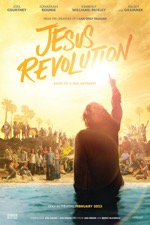
Starring: Joel Courtney
February 2023
Warning! This is NOT a movie review. This is a critique of the film. Intended to initiate a dialogue, the following analysis explores various aspects of the film and may contain spoilers. For concerns over objectionable content, please first refer to one of the many parental movie guide websites. Ratings are based on a four star system. Happy reading!
Based on true events, Jesus Revolution chronicles the early days of a spiritual movement that started in California and swept across the U.S. in the early 70s.
The film opens with aging pastor, Chuck Smith (Kelsey Grammer), shepherding aging parishioners; they sit like statues, uninspired by his passionless homily. While watching TV at home, Chuck makes a negative remark about the sea of longhaired youth at a protest. His daughter says he shouldn’t pass judgment on the hippies. The next day, she brings one home to confront her father with his own prejudice. The Jesus-looking hippie is named Lonnie (Jonathan Roumie).
Lonnie invites his friends over to Chuck’s house, and soon, the church is overrun with the barefoot brigade. On the plus side, Lonnie and his lot breathe life into the church, bringing lively music, excitement and a hunger for the truth to the calcified congregation. Now Chuck is faced with a difficult decision: should he embrace these colorful newcomers and risk losing his members, or send the hippies packing and return to business as usual?
The second word in title might give you a hint as to what Chuck did.
Not only does the movie center on an inflection point in our nation’s history, it also dramatizes a major turning point in the lives of three prominent ministers—Chuck Smith from Calvary Chapel, evangelist Lonnie Frisbee and Greg Laurie (played by Joel Courtney) of Harvest Christian Fellowship. Each of these men has made an indelible impact on the way countless Protestant churches operate, serve and worship today.
Co-directed by Jon Erwin (I Can Only Imagine) and Brent McCorkle, Jesus Revolution perfectly captures the look and feel of the late 60s and early 70s. From the shaggy coifs and grubby duds to the psychedelic “Magic Bus,” every frame of the film feels true to the period. Another layer of authenticity is the washed out, “old film stock” look; a visual style that’s effective in many of the movie’s outdoor scenes, particularly those shot at the “Pirate’s Cove” location.
The movie boasts many fine young actors, particularly Courtney and Anna Grace Barlow, who plays Cathe, Greg’s girlfriend. Headlining the cast is Grammer, who deftly negotiates the emotions of a man caught between two worlds: traditional Christianity and the new movement embraced by the youth of the era. Kudos to Grammer for choosing to be involved with this project and for being so outspoken about his faith. Many have been cancelled for less.
The other veteran actor in the movie is Kimberly Williams-Paisley, who plays Greg’s mother in a minor and fairly unsympathetic role. Of course, Roumie is a major draw for many in the audience since he plays Jesus in “The Chosen.” Tough his wardrobe is different here, Roumie retains his messianic appearance from the Biblical series. However, fans of the series might be thrown for a loop the first time they hear him speak.
Aside from its terrific cast, historical accuracy and excellent production elements, the movie has a lot to say about our culture, both then and now.
For a Christian film, there’s a surprising surfeit of drug content here, although most of the drugs are mentioned, not shown. Speaking of his generation, Lonnie says, “Drugs were a quest…for God.” Though many claimed “acid would save the world,” it was a lie; there was “still a void.” He admits that his contemporaries were “searching for all the right things in all the wrong places.”
This highlights one of the movie’s main themes—the search for truth. The youth of the 60s and 70s were tired of being lied to by parents and a corrupt government, and turned to sex, drugs and rock and roll to try and escape a world gone mad.
Ironically, what the youth of that period were searching for, “Peace and Love,” are hallmarks of Christianity (Galatians 5:22-23). Observing the similarities between the rallying cry of the countercultural youth of the day and the mission of the church, Chuck’s daughter wisely asks him, “Don’t you want the same thing?”
In one scene, Cathe says, “What if there is no truth?” Greg picks up on her reference to one of the popular philosophies espoused by Allen Ginsberg. Greg rejects this notion: “Some things are absolutely true.” Even before his conversion to Christianity, Greg believed that there’s one objective truth.
Chuck’s wife Kay (Julia Campbell) makes this profound statement, “The truth is always quiet; the lies are always loud.” She buttons up her point with, “The truth is simple.”
I sincerely hope our politicians are reading this.
Jesus Revolution is much more than a religious biopic. It’s a heartfelt drama that also has comedic and romantic elements. It’s a story of renewal and redemption. A tale of faith and friendship.
It’s been said that with God there are no coincidences. So then, it’s no coincidence that just before the release of Jesus Revolution, a revival broke out at Asbury University in Kentucky. Perhaps what’s started there will be the beginning of a new Jesus Revolution. And considering the fact that this movie opened the same weekend as Cocaine Bear, boy do we need it!
Rating: 3 out of 4
I Still Believe (PG)

Starring: Britt Robertson
March 2020
Warning! This is NOT a movie review. This is a critique of the film. Intended to initiate a dialogue, the following analysis explores various aspects of the film and may contain spoilers. Views are my own and elaborate on comments that were originally tweeted in real time from the back row of a movie theater @BackRoweReviews. For concerns over objectionable content, please first refer to one of the many parental movie guide websites. Ratings are based on a four star system. Happy reading!
Based on the real-life experiences of singer Jeremy Camp, I Still Believe is a unique film in that it’s both heartbreaking and inspiring. That bittersweet dichotomy permeates every moment of this tragic love story, which also focuses on faith and family.
Jeremy Camp (K.J. Apa) and Melissa Henning (Britt Robertson) meet at a concert and it soon becomes apparent that their love is written in the stars. But the universe throws the young couple a curveball when Melissa is diagnosed with cancer.
To its credit, the story doesn’t degenerate into a melodrama when depicting its tragic events. There isn’t a false note during the film’s emotionally gut-wrenching passages, particularly those that take place in the hospital.
The film benefits from some superb acting. Though Apa and Robertson scintillate as the movie’s central couple, the supporting cast is equally impressive. Jeremy’s parents are portrayed by Gary Sinise and Shania Twain. One of Melissa’s sisters is played by Melissa Roxburgh, the star of TVs Manifest. In an ironic bit of casting, Cameron Arnett, who played a terminal patient in last year’s Overcomer, appears here as Melissa’s doctor.
The film is directed by the Erwin Brothers (Andrew and Jon), who also helmed last year’s surprise hit I Can Only Imagine; another biopic about the life of a musician, Bart Millard. In a refreshing gesture of paying it forward, Millard serves as one of this movie’s producers.
The Erwin’s have done an amazing job of making a modestly budgeted film feel like a prestige studio drama. Aerial shots, like the ones at Camp’s beachside concert, are impressive and surely weren’t cheap to film. The movie also boasts a diverse soundtrack and an affecting score by John Debney (The Passion of the Christ).
A two-hanky tearjerker, this film will have added significance for anyone who’s lost someone. It’s an eternally hopeful love story filled with music and more than its fair share of genuine, human moments.
In the end, I Still Believe is a moving true story of true love. It’s anchored by superb performances and features a story unafraid to ask some of the big questions about life…and death. And what it means to really believe.
Rating: 3 out of 4
Overcomer (PG)
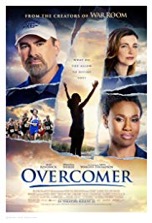
Starring: Alex Kendrick
August 2019
Warning! This is NOT a movie review. This is a critique of the film. Intended to initiate a dialogue, the following analysis explores various aspects of the film and may contain spoilers. Views are my own and elaborate on comments that were originally tweeted in real time from the back row of a movie theater @BackRoweReviews. For concerns over objectionable content, please first refer to one of the many parental movie guide websites. Ratings are based on a four star system. Happy reading!
The Kendrick Brothers (Alex and Stephen) have delivered a string of family-friendly, faith-affirming films over the years, including: Fireproof (2008), Courageous (2011) and War Room (2015). As with many of the Kendrick’s earlier movies, Overcomer uses sports as a vehicle for telling a tale of hope, faith and courage.
As the story opens, successful high school basketball coach John Harrison (Alex Kendrick) learns that the town’s manufacturing plant has closed its doors. John’s hopes of winning a state championship are dashed when many of his players are forced to move away with their families. Pressed into service as a long-distance running coach, John’s team consists of one runner, Hannah Scott (Aryn Wright-Thompson). In a cruel twist of fate, Hannah has asthma.
Through pure coincidence (or a Godincidence), John meets Thomas Hill (Cameron Arnett) when visiting someone else at a hospital. After striking up a conversation with the blind, bedridden man, John discovers that Thomas is Hannah’s long-lost father. The family drama heats up when Hannah meets Thomas for the first time and when her guardian grandmother (Denise Armstrong), who has intentionally kept Hannah from learning about her former drug addict father, finds out that Hannah’s been sneaking out to meet with Thomas.
Overcomer sets up in a similar manner to Disney’s McFarland, USA (2015), which chronicles the true story of high school track coach Jim White (Kevin Costner), who relocates to the titular town to become a cross-country coach. In this film, John doesn’t have to move, but the school’s principal (Priscilla Shirer) coaxes him into coaching a sport he knows next to nothing about. In both movies, unlikely athletes make it to the state championship, which results in a highly improbable, yet wholly satisfying story payoff.
Admittedly, the plot is oversimplified and idealistic to the extreme. Though the film has many saccharine moments, and even a few unnecessary scenes (the knee-slapping drama auditions, for instance), it has several salient themes, like: finding redemption, making amends (the movie cleverly avoids sermonizing by resolving the kleptomania subplot with a montage) and learning how to forgive.
Another theme that’s subtly woven into the fabric of the film is the discovery of identity. In a world where identity is confusing, complex and constantly in flux, Overcomer presents an extremely simple definition of identity that’s as counter-cultural as you’re likely to find. The movie’s core audience will embrace this interpretation of identity, but will it make an impact on the broader populace?
The film contains a number of nitpicks. For instance, in real life, people (especially non-relatives) wouldn’t be allowed to just stroll into a hospital (without visitor’s tags, no less) whenever they feel like it. Also, a cross-country team consists of seven runners, so Hannah wouldn’t be allowed to race by herself. Fortunately, these peccadilloes don’t significantly detract from the movie’s overall message or entertainment value.
In the final analysis, Overcomer is an inspirational story with heartfelt performances and pulse-pounding race scenes. Are you an Overcomer?
Rating: 3 out of 4
The Case for Christ (PG)
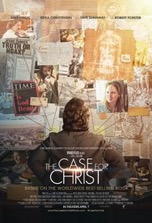
Starring: Mike Vogel
April 2017
What follows is the full-length review based on comments that were originally tweeted in Real-time from the back row of a movie theater @BackRoweReviews. Though efforts were made to tease rather than ruin this movie’s memorable lines and moments, some spoilers may exist in the following evaluation. For concerns over objectionable content, please first refer to one of the many parental movie guide websites. Ratings are based on a four star system. Happy reading!
Based on the true story of how Chicago Tribune reporter, Lee Strobel (Mike Vogel), set out to debunk Christianity in the early 80s, The Case for Christ is a challenging biopic that proceeds in an investigative manner and delivers its evidence fairly and without being overly preachy. As a stone cold atheist, Lee launches into a zealous, one-man crusade to discredit Christianity when his wife, Leslie (Erika Christensen), starts attending church and becomes a follower of Jesus. Lee embarks on a cross-country trek to discover the truth, interviewing experts on both sides of the argument. In the end, Lee comes to the realization that either way, believing or not believing in Christ, requires a leap of faith. Vogel (Under the Dome) and Christensen (Parenthood) are effective in their leading roles as a couple struggling to reconcile their divergent worldviews. Robert Forster, as Lee’s estranged father, and Faye Dunaway, as a professor of psychiatry at Purdue University, are dependably good in their ancillary roles. The coifs and costumes are all appropriate to the milieu, as are the product placements, i.e., the yellow bottle of Joy dish soap and Lee’s Motorola pocket pager. For a pro-faith film, this is an impressive production, especially when considering the quality of the typical Christian film. In the end, no matter which side of the argument you’re on, you must admit that this movie makes a compelling case.
The Young Messiah (PG-13)

Starring: Adam Greaves-Neal
March 2016
The below comments (in Black) were originally tweeted in Real-time from the back row of a movie theater and appear @BackRoweReviews. Though efforts were made to tease rather than ruin this movie’s memorable lines and moments, some spoilers may exist in the following evaluation (in Red). For concerns over objectionable content, please first refer to one of the many parental movie guide websites. All ratings are based on a four star system. Happy reading!

How to draw a camel in the sand.
Death by apple.
Early miracle. #BirdResurrection
“Cavemen in Britain.” Was Britain even around back then?
“Destined to wander.” Israel has a history of wandering.
“How do you explain God to his own son?” #Dilemma
“Next time there will be no mercy.” True. #Crucifixion
Dreams run in the family. Keen observation.
“The boy must die.” Good luck with that...he dies at 33.
“He is not just a child.” Amen.
A glimpse of the future. #CrucifixionRoad
“The Romans fear the young.” With good reason.
“I like this child.” Me too.
The #AngelChild tells #Satan to keep his hands to himself.
Don’t say the word rain around #Jesus or it’ll start raining.
“She’s just a woman.” Show more respect for Mary.
Romans in the temple. Oh my!
“God is your father.” A big question is answered for #Jesus.
Final analysis: a unique telling of #Jesus’ early years with some beautiful locations and a solid cast.
Rating: 2 1/2 out of 4. Perfect casting of the central role infuses the film with joy and compassion.
A host of films have focused on the life of Jesus, and the vast majority of those have included the same basic story elements, i.e.,: his birth, ministry, crucifixion, resurrection, ascension, etc. Since the entire film focuses on the titular savior at age seven (even though the temple scene actually took place when he was twelve), The Young Messiah is an exception to the typical theological presentation. But with little to no Biblical backing for many of the events in the film, what Messiah gains in originality it loses in authenticity. Taking its cue from the recent Roman soldier spotlight film Risen, Messiah applies the 80/20 Rule to its narrative structure, with 80% of the story extrapolated from recorded history and dramatized for a mass audience and only 20% coming directly from passages in the Bible. The most noticeable deviation from the holy text is when young Jesus (Adam Greaves-Neal) performs miracles while he’s a boy living in Egypt. There’s no scriptural support for this plot point, and to the contrary, the Bible records Jesus’ first miracle at the wedding in Cana (John 2:1-11) when he was thirty. Be that as it may, the young lad having to conceal or constrain his supernatural powers is an interesting plot point that’s analogous to many comic book yarns where the hero tries to hide his abilities in order to blend in with the general populace (Superman being chief among these archetypes since, as many have noted, the Man of Steel’s messianic origin story and miracle working abilities directly parallel Christ’s). However non-canonical this subplot is, it does create tension and intrigue, especially in the early passages of the film (although I could’ve done without the gimmicky bird resuscitation scene). Also, like in Risen, Messiah features several new story elements that work quite well, including: Sean Bean as Roman centurion Severus, a conflicted soldier who is tasked with killing the young healer, and the Spartacus (1960) style Roman road flanked with crucified Jews. I was hoping that young Jesus would look up and knowingly stare at a cross…a foreshadowing of his impending demise. But alas, this is just one of many examples in the film of how an opportunity to create art was passed over (pun intended), which might speak to a lack of vision on the part of director Cyrus Nowrasteh or a shortage of shekels which shackled the production. All is not lost artistically though, since there’s a really nice aerial shot of Jesus’ family traversing the serpentine road lined with crosses at the end of the sequence. Despite period appropriate costumes and a handful of decent location shots, the film has a decidedly cash-strapped appearance. Sometimes acting can help elevate a budget-challenged picture (like Ben Kingsley in Walking with the Enemy), but such is not the case here. Other than Greaves-Neal, Bean and Sara Lazzaro (who plays Jesus’ mother, Mary), the rest of the cast members deliver par or subpar performances. All things considered, this was a valiant attempt at focusing on a brief chapter in Christ’s early years, but the writing, acting, directing and overall production didn’t support its vision or potential. Ironically, Messiah will go down as just another average Bible film that failed to inspire its audience.
The Passion of the Christ (R)
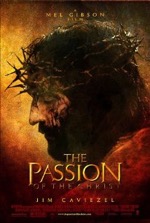
Starring: Jim Caviezel
February 2004
“The Most Graphic Story Ever Told”
The Passion of the Christ is the most powerful and controversial movie ever made. What makes the film powerful is an engaging script, emotional performances and inspired direction; it’s the first “Jesus” movie that’s ever depicted the Savior with more than just a trickle of blood flowing down His brow. It’s controversial because of the graphic scenes surrounding Christ’s torture and crucifixion and due to charges of anti-Semitism.
POWERFUL:
Beyond the scourging and crucifixion, The Passion of the Christ is powerful because of the humanness of the characters and the horrific situations they find themselves in. Take Pilate (Hristo Naumov Shopov), for example; reticence is written all over his face as he presents Jesus to the seething mob. Whether filled with compassion or dispassion, it’s very clear that Pilate feels trapped and just wants to rid himself, one way or the other, of “the king of the Jews.” And then there’s Mary, mother of Jesus (Maia Morgenstern). As Jesus stumbles down the Via Dolorosa, toting the cross on His back, He falls to the ground and Mary has a flashback to when Jesus tripped and scraped His knee as a boy. Who will ever forget the look on her face? Or who will ever be able to forget Jesus’ anguish in the garden or the scourging or the crucifixion as a result of James Caviezel’s Oscar-caliber performance? Or the downright creepy portrayal of Satan by Rosalinda Celentano?
CONTROVERSIAL:
Is The Passion of the Christ anti-Semitic? Pilate washes his hands of Christ’s blood, so that would seem to place bloodguilt on the Jewish people. And yet, it was the Romans that nailed Him to the cross. I think the point is clear: we are all guilty. It was our sin that nailed Christ to the cross; that’s why none of the faces of the Roman guards are shown. It’s almost as if director, Mel Gibson, is saying, “insert your face here.” As has been well publicized, it was Mel’s hands that were shown hammering the nails into Christ’s hands and feet in the movie—we must all take responsibility for the weight and consequences of our sin. That’s the message of the movie, not that the Jews were solely at fault.
The film is also controversial in some Protestant circles, as Gibson textured the movie with many added or contrary elements borrowed from Catholic mystic, Anne-Catherine Emmerich. At first glance, the aberrations from the sacred text simply seem to be stylistic embellishments, but upon further scrutiny, these altered scenes would certainly smack of heresy in the Protestant mind.
Here are just a few prime deviations from scripture: 1. Satan tempts Jesus in Gethsemane, 2. Jesus is lashed thirty-nine times on the front and back, 3. Pilate’s wife gives Mary some towels, 4. Mary and Mary Magdalene wipe up Jesus’ blood after the whipping, 5. A crow pokes out the eye of the unrepentant thief and 6. Roman soldiers take Jesus off the cross (the Bible claims that Joseph of Arimathaea and Nicodemus took Him down).
Whether you view the movie as controversial or whether you even believe the story is presents, there should be no doubt in anyone’s mind that this is a stupendous achievement…a superior piece of cinema. With A-list acting, directing, writing and scoring, The Passion of the Christ is an illumined effort, divinely crafted with images and events that won’t soon be forgotten.
Rating: 4